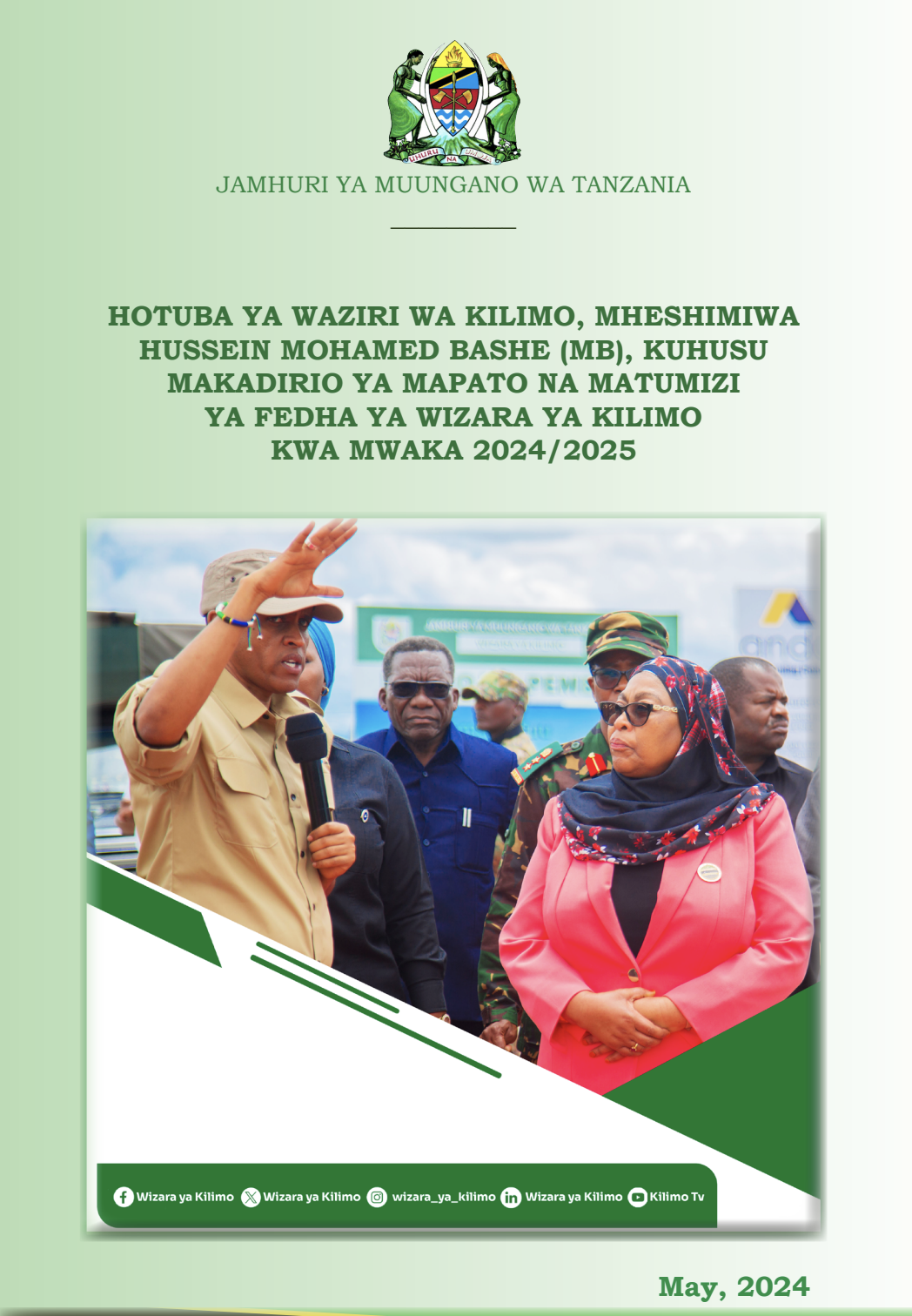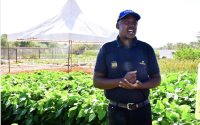A Vision for Tanzania’s Agricultural Future: Minister Hussein Mohamed Bashe Presents the 2024/2025 Agricultural Budget
In a landmark speech delivered with urgency and optimism, Tanzania’s Minister of Agriculture, Hon. Hussein Mohamed Bashe, unveiled the 2024/2025 budget for the Ministry of Agriculture. This comprehensive financial plan underscores the government’s commitment to transforming the agricultural sector, which remains the backbone of Tanzania’s economy. With a focus on infrastructure, research, market access, and farmer support, this budget is poised to address key challenges and leverage opportunities to bolster agricultural productivity and sustainability.
The Importance of Agriculture in Tanzania
Agriculture is the lifeblood of Tanzania’s economy, employing a significant portion of the population and contributing substantially to the country’s GDP. It is also a critical sector for ensuring food security and promoting rural development. Recognizing this, the government’s budget for 2024/2025 prioritizes strategic investments aimed at revitalizing the sector.
Budget Overview
The 2024/2025 agricultural budget outlines a total expenditure of TZS 300 billion. This amount is allocated to various critical areas intended to improve the sector’s infrastructure, enhance research and development, increase market access, and provide essential support to farmers. The budget is also designed to foster public-private partnerships and attract foreign investment in the agricultural sector.
Key Areas of Focus
- Infrastructure Development:
- Irrigation Systems: A significant portion of the budget is dedicated to constructing and rehabilitating irrigation infrastructure. This investment aims to increase the irrigated land area, ensuring a more reliable water supply for crops and mitigating the impacts of climate variability.
- Rural Roads: Improving rural road networks is another critical area of focus. Enhanced transportation infrastructure will facilitate easier and faster movement of goods from farms to markets, reducing post-harvest losses and increasing farmers’ incomes.
- Research and Development:
- Scientific Research: The budget allocates funds for agricultural research institutions to develop new crop varieties, pest control methods, and innovative farming techniques. This research is essential for increasing crop yields, improving resistance to diseases and pests, and adapting to climate change.
- Farmer Training: Providing training and extension services to farmers is a priority. These services will equip farmers with modern farming practices, proper use of agricultural inputs, and knowledge on sustainable farming techniques.
- Market Access and Value Addition:
- Market Infrastructure: Investments will be made to improve market infrastructure, including storage facilities and marketplaces. These improvements aim to enhance market access for farmers, reduce post-harvest losses, and stabilize prices.
- Value Addition: The budget also supports initiatives to promote value addition through agro-processing. Establishing and expanding agro-processing facilities will help transform raw agricultural products into higher-value goods, creating more income opportunities for farmers and boosting the economy.
- Farmer Support:
- Subsidies and Inputs: The government plans to provide subsidies for essential agricultural inputs such as fertilizers and seeds. These subsidies aim to reduce production costs and increase productivity, particularly for smallholder farmers.
- Financial Services: Credit facilities and insurance schemes will improve farmers’ access to financial services. These services will help farmers invest in their farms, manage risks, and recover from adverse events.
Addressing Key Challenges
Minister Bashe’s budget speech did not shy away from acknowledging the challenges facing Tanzania’s agricultural sector. Issues such as climate change, inadequate infrastructure, limited market access, and insufficient research funding were highlighted. The budget aims to address these challenges through targeted investments and strategic initiatives.
Climate Change: The impacts of climate change, including erratic weather patterns and increased frequency of extreme events, pose a significant threat to agriculture. The budget’s focus on irrigation and research into climate-resilient crops is a proactive measure to mitigate these effects.
Infrastructure Deficiencies: Poor infrastructure, particularly rural areas, hampers agricultural productivity and market access. The budget’s allocation for improving rural roads and market facilities is expected to substantially impact the sector.
Market Access: Limited access to domestic and international markets restricts the potential of Tanzanian agriculture. By investing in market infrastructure and promoting value addition, the government aims to create new market opportunities for farmers and increase their competitiveness.
Funding for Research: Adequate funding for agricultural research is crucial for innovation and development. The budget’s commitment to supporting research institutions will help generate the knowledge and technologies needed to propel the sector forward.
A Collaborative Effort
The successful implementation of the 2024/2025 agricultural budget requires the collaboration of various stakeholders, including government agencies, private sector partners, international donors, and the farmers themselves. Minister Bashe emphasized the importance of partnerships in achieving the budget’s goals. He called for active participation from all sectors to ensure that the allocated funds are used effectively and achieve the desired outcomes.
Looking Ahead
The 2024/2025 agricultural budget marks a significant step forward in the government’s efforts to transform Tanzania’s agricultural sector. By addressing critical challenges and focusing on key areas of development, the budget aims to create a more resilient, productive, and sustainable agricultural system. This, in turn, will contribute to economic growth, food security, and improved livelihoods for millions of Tanzanians.
As Tanzania moves forward with this ambitious plan, the nation and the world will be watching the implementation and impact of these investments. With strong leadership, effective collaboration, and unwavering commitment, Tanzania’s agricultural sector is poised for a transformative journey to benefit future generations.
In conclusion, Minister Bashe’s budget speech is a rallying call to action, urging all stakeholders to unite to build a brighter future for Tanzania’s agriculture. The path ahead is challenging, but with determination and collective effort, the 2024/2025 budget goals are within reach.
Here is the full budget speech


